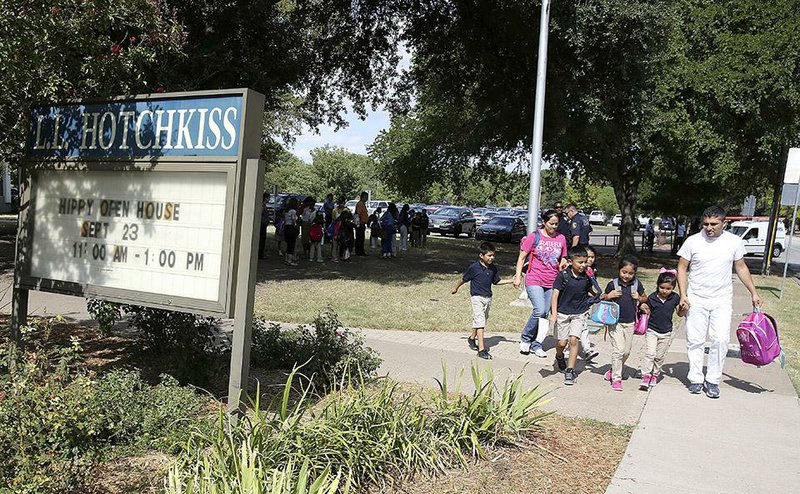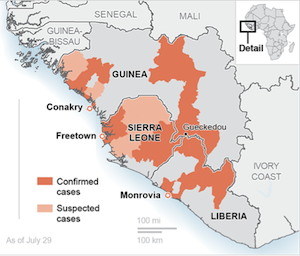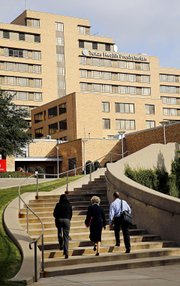DALLAS -- Health officials in Dallas said Wednesday that they are monitoring at least five schoolchildren in north Texas who came into contact with a man with the Ebola virus after he became sick and contagious.
Authorities also said an early opportunity to put the patient in isolation, limiting the risk of contagion, may have been missed because of a failure to pass along critical information about his travel history.
The patient was identified by Liberian health officials as Thomas Eric Duncan. The Liberian flew to Brussels before coming to the United States on Sept. 20 on United Flight 951 to Dulles Airport near Washington, officials said. He then flew Flight 822 from Dulles to Dallas-Fort Worth International Airport.
Liberia is one of several countries battling an Ebola epidemic in West Africa. Officials with the U.S. Centers for Disease Control and Prevention are helping staff members at the airport in the capital, Monrovia, where passengers are screened for signs of infection and asked about their travel histories.
Duncan was screened and showed no sign of illness during the flight to America, health officials said.
Because Ebola is not contagious until symptoms develop, there is "zero chance" that Duncan infected anyone else on his flights, said Dr. Thomas Frieden, the director of the CDC. Ebola is spread only by direct contact with body fluids from someone who is ill.
"Ebola doesn't spread before someone gets sick, and he didn't get sick until four days after he got off the airplane," Frieden said.
Duncan worked at a shipping company in Monrovia but had just quit his job, giving his resignation in early September, his boss said. He got a visa to the U.S. to visit family, said his neighbors in Liberia.
The neighbors said Duncan may have become infected after his landlord's daughter fell ill. On Sept. 15, Duncan helped his landlord and his landlord's son carry the stricken woman to the hospital, his neighbors and the woman's parents said. She died the next day.
Soon, the landlord's son also became ill, and he died Wednesday in an ambulance on the way to the hospital. Two other residents in the neighborhood who may have had contact with the woman have also died. Their bodies were collected Wednesday as well.
Health officials in Dallas said Wednesday that they believed that Duncan came in contact with at least 12 to 18 people after he was experiencing symptoms. So far, none have been confirmed to be infected.
The five children, who possibly had contact with Duncan at a home over the weekend, attended four different schools, which authorities said would remain open. As a precaution, they said, all the schools -- including one high school, one middle school and two elementary schools -- would undergo a thorough cleaning.
Dallas Independent School District Superintendent Mike Miles said the students were in class this week after possibly being in contact with the man, but that none were showing symptoms. The five children are being monitored at home.
Some parents picked up their children from school early on Wednesday after officials announced the students may have been in contact with Duncan.
Marcie Pardo was among several parents who left L.L. Hotchkiss Elementary School. She said her child won't be back this week.
"It's the contagious part" that's worrisome, Pardo said.
Missed diagnosis
Health officials on Wednesday continued to track down other people who might have been exposed to Duncan after he began showing symptoms, on Sept. 24, and will monitor them every day for 21 days -- the full incubation period of the disease.
Most people develop symptoms within eight to 10 days. As a patient becomes sicker and the virus replicates in the body, the likelihood of the disease spreading grows. Ebola is spread through direct contact with the bodily fluids of a sick person.
"If anyone develops fever, we'll immediately isolate them to stop the chain of transmission," Frieden said.
Even as public officials sought to reassure the public that the situation was under control, there were questions about how the patient was treated when he first went to a hospital Friday.
Dr. Mark Lester, executive vice president of the Texas Health Resources System, of which the hospital is a part, said hospital employees had been instructed to ask patients about their travel history, following the advice of federal authorities.
That checklist, he said, was used by a nurse, and the patient volunteered that he had just come from Liberia. "Regretfully that information was not fully communicated" to the full medical team, Lester said.
As a result, that information was not used in the clinical diagnosis, and Duncan was sent home, with the diagnostic team believing he had a low-grade fever from a simple viral infection. He returned to the hospital two days later in worse condition and is now being treated in isolation at Texas Health Presbyterian Hospital of Dallas.
Other people who came into contact with him after he fell ill include relatives and the medical technicians who took him by ambulance to the hospital. At least three Dallas Fire and Rescue emergency medical technicians are being monitored and are in isolation at home, officials said.
Even the emergency vehicle that was used -- Ambulance No. 37 -- is in isolation and not in service.
Meanwhile, an apartment building not far from Texas Health Presbyterian became the center of attention Wednesday after reports that Duncan stayed there with family before being taken to the hospital.
Residents described the Ivy Apartments, about a mile from the Dallas hospital, as housing a multiethnic community of Liberians, Nepalis and other nationalities. There are an estimated 10,000 Liberians living in a four-county area that includes Dallas County.
Toni Gomez, 29, stood outside holding her 1-year-old daughter, Demauria Griffen. She said people in the neighborhood were afraid to even go near the hospital.
"My mother called me and said, 'Do not go to Texas Health Presbyterian. You could catch Ebola.' And I said, 'Mama, that's the closest hospital I can go to. What do you want me to do?'"
Patients being treated at the Dallas hospital, their families and others in the neighborhood have expressed concern about how officials were responding to the case and called for more information to be released about Duncan.
Officials tried to quell their fears Wednesday.
"The CDC is on the ground, and we are going individual by individual that he had contact with, making sure they are in the appropriate isolation," said Mayor Michael Rawlings of Dallas. "There is very little risk at this point for folks that just live in the general area."
Still, many in the community were skeptical of the assurances, especially as they hear ever more dire reports from relatives and friends back in Africa.
World toll at 3,300
The World Health Organization on Wednesday said the Ebola outbreak, the worst ever of the virus, has sickened more than 7,000 people, with more than 3,300 deaths linked to the disease.
Liberia is one of the three hardest-hit countries, along with Sierra Leone and Guinea. Nigeria and Senegal also saw some cases, but the outbreaks there are now believed to be contained.
The United Nations said Wednesday that a staff member in Liberia has died from "probable Ebola." A spokesman for Secretary-General Ban Ki-moon said the death is the first of a U.N. employee in the outbreak that he is aware of.
Stephane Dujarric said the staff member, a Liberian, was working with the U.N. mission in that country. The secretary-general's special representative said the staff member died last week.
"It is a sad reminder of the ever-present risk, and sobering for us as a mission and as the U.N. family," Karin Landgren said.
Global concern about the outbreak has led the United Nations to create a separate mission targeting the virus to be established in the capitals of the three main affected countries this week.
Meanwhile, in an update issued Wednesday, WHO said it was optimistic there would be a fully tested and licensed Ebola vaccine available for use in mass vaccination campaigns, possibly starting in 2015.
At the conclusion of a vaccine meeting at the agency's Geneva headquarters this week, WHO said experts were aiming to "accomplish, within a matter of months, work that normally takes two to four years."
Other Ebola researchers have previously said that it would be unlikely that using untested vaccines could help slow the outbreak.
WHO acknowledged there were significant technical problems with using vaccines in West Africa, including the requirement that vaccines must be stored at minus 112 degrees Fahrenheit. Experts also said it was important to test the use of the immunizations in all groups, including children, pregnant women and people with HIV.
Even with "massive efforts," WHO said, a significant number of vaccine doses would not be available until late in the first quarter of 2015.
Information for this article was contributed by Manny Fernandez and Marc Santora of The New York Times; by Cara Anna, Maria Cheng, Sarah DiLorenzo, Paul J. Weber, Lauran Neergard, David Koenig, Scott Mayerowitz, Nomaan Merchant, Emily Schmall, Jonathan Paye-Layleh, Francis Kokutse, Matt Small and staff members of The Associated Press; and by John M. Glionna and Molly Hennessy-Fiske of the Los Angeles Times.
A Section on 10/02/2014


